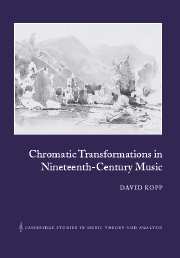Book contents
- Frontmatter
- Contents
- Foreword by Ian Bent
- Acknowledgements
- 1 Common-tone tonality
- 2 Three examples of functional chromatic mediant relations in Schubert
- 3 Key harmonic systems and notions of third relations from Rameau to Hauptmann
- 4 Hugo Riemann
- 5 Twentieth-century theory and chromatic third relations
- 6 Riemann's legacy and transformation theories
- 7 A chromatic transformation system
- 8 Chromatic mediant relations in musical contexts
- 9 Five analyses
- Bibliography
- Index
- Compositions cited
9 - Five analyses
Published online by Cambridge University Press: 22 September 2009
- Frontmatter
- Contents
- Foreword by Ian Bent
- Acknowledgements
- 1 Common-tone tonality
- 2 Three examples of functional chromatic mediant relations in Schubert
- 3 Key harmonic systems and notions of third relations from Rameau to Hauptmann
- 4 Hugo Riemann
- 5 Twentieth-century theory and chromatic third relations
- 6 Riemann's legacy and transformation theories
- 7 A chromatic transformation system
- 8 Chromatic mediant relations in musical contexts
- 9 Five analyses
- Bibliography
- Index
- Compositions cited
Summary
COMMENTS ON THIS CHAPTER
The analyses contained in this chapter will serve as the culminating argument for the utility of the common-tone approach advocated throughout this study. They present pieces in which chromatic third relations play crucial roles in concert with other common-tone relations. The manner of description and analysis draws on aspects of all of the preceding chapters. The following ideas underlie my viewpoint: that chromatic mediant relations, like fifth-change and relative-mode relations, are functional; that the tonal system can support chromatic relationships along with diatonic ones without loss of the sense of tonic; that harmonic relationships are holistic entities whose essence may surpass the sum of their parts; that root relationships between chords are not necessarily bound to the scale; and that dualism, where it occurs, may be a derived rather than a defining element of the system. The language of common-tone relations and transformations represents first and foremost a way of thinking directly about chromatic harmony in music. This language provides for a way both to identify chromatic mediants directly within the key (LFM, USM), as well as to describe localized harmonic progressions in expanded tonality (Riemann's Tonalität) by their nature, without reference to scale degree, in the new tradition of transformation theory.
- Type
- Chapter
- Information
- Chromatic Transformations in Nineteenth-Century Music , pp. 235 - 263Publisher: Cambridge University PressPrint publication year: 2002

